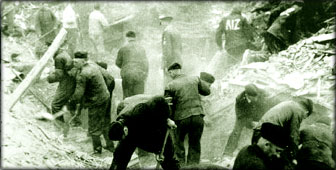
Chemical firms exploited Nazi links, probe found

Several leading Swiss firms collaborated with the Nazi regime to boost profits and expand their interests in Germany, according to the findings of an Independent Commission of Experts (ICE) set up to probe Switzerland's wartime past.
The ICE singled out the Basel chemical companies Ciba and Sandoz (now merged into Novartis), which implemented the Nazis’ Aryanisation policies in a bid to win lucrative supply contracts from the Third Reich.
It found that Ciba’s Berlin branch in 1933 fired its Jewish board of directors and supervisory board members and replaced them with “Aryan” Germans. At the same time, the report said, Sandoz replaced the Jewish chairman of its German subsidiary with an “Aryan” businessman.
The findings are part of eight studies released this week by the ICE, which says several leading Swiss chemical firms – including JR Geigy, Ciba, Sandoz and Hoffmann-La Roche – put their own interests ahead of humanitarian concerns in their dealing with the Nazis.
The ICE concluded that the chemical firms’ bosses in Switzerland “possessed a high level of detailed knowledge about the political and economic situation in Nazi Germany… [and] incorporated their knowledge… into their economic planning and used it as a basis for decision-making”.
All the companies concerned owned factories in Germany between 1933 and 1945, as well as in wartime-occupied Poland, and were important suppliers of chemicals, dyes and pharmaceuticals for the Third Reich.
The ICE found the firms also had extensive contacts among the Nazis: “Geigy maintained particularly good relations Claus Ungewitter, the Reich commissioner for chemicals… Roche had good contacts with the Wehrmacht (armed forces)….”
Forced labour described
The report also singled out Geigy and Roche for using forced labour at their plants in Germany. It said at least 33 Dutch and French labourers were forced to work for Geigy between 1943 and 1945, while at least 61 prisoners-of-war and 150 foreign labourers were forced to work at the Roche plant.
“The report notes that Roche did not employ any Jewish or concentration camp forced labourers,” said Jacqueline Wallach, spokeswoman for Roche. “The forced labourers employed were mainly from Eastern Europe, and according to the report (…) they were always treated humanely.”
In a separate report focusing on the issue of forced labour, the ICE focused its inquiries on a handful of other Swiss firms, including Brown Boveri & Cie (now merged into ABB), Nestlé, Lonza, Aluminium-Industrie, and Alimentana/Maggi.
It said the companies’ claims that they were cut off from their subsidiaries in Germany were patently false: “Senior managers at the parent company in Switzerland were aware that forced labour was being used… As a rule they were not worried or uneasy about the situation, and as long as production was maintained they had no thoughts of intervening…”
However, the report made clear that senior management was not necessarily in full control of their subsidiaries in Germany.
Several Swiss companies had admitted that they or their affiliates used slave labour in Nazi Germany, and some, among them Nestlé and ABB, have paid compensation.
Novartis responds to report
Novartis, which made the archives of Ciby, Geigy and Sandoz “fully available” to the commission for its investigation, said the Bergier Report presents a “balanced assessment” based on the sources used, but that not all the available documents could be processed.
“In the face of concerns about continuing operations with its workforce in Germany and the occupied territories and about the inhumanity of the National Socialist’s racial policy, many decision-makers at that time were conrfronted with dilemmas which called for difficult decisions. Some of the decisions and actions at the time were ethically and morally dubious when viewed from today’s perspective,” the company said in a statement.
The statement said that “unequivocally…our predecessor companies were not pro-Nazi.”
Novartis made a SFr25 million (nearly $15 million) contribution to a settlement negotiated by Swiss banks of claims dating from the Second World War.
swissinfo

In compliance with the JTI standards
More: SWI swissinfo.ch certified by the Journalism Trust Initiative



























You can find an overview of ongoing debates with our journalists here . Please join us!
If you want to start a conversation about a topic raised in this article or want to report factual errors, email us at english@swissinfo.ch.